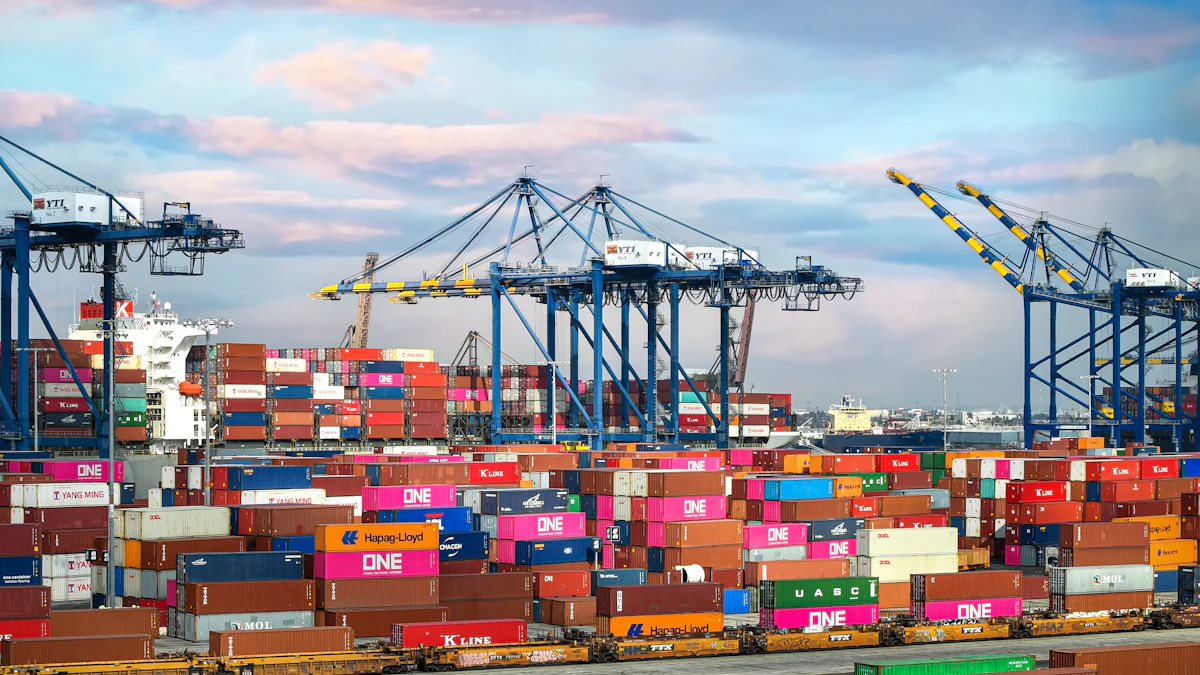Comparing Automotive Supply Chain Solutions: A Comprehensive Guide

The automotive supply chain serves as a critical backbone for the industry, ensuring the seamless flow of components and materials. Recent disruptions have highlighted the challenges faced by this intricate network, emphasizing the need for robust solutions. As the sector navigates through transformations driven by digitalization and market dynamics, selecting the right supply chain approach is paramount. In this blog, we delve into a comparative analysis of various automotive supply chain solutions to unveil their distinct benefits and efficiencies.
Traditional Automotive Supply Chain
In the realm of automotive supply chain, the traditional approach encompasses a structured process that involves various components seamlessly coming together. The acquisition of spare parts serves as a fundamental aspect, ensuring the availability of essential components for vehicle assembly. This step is crucial in maintaining production timelines and meeting customer demands promptly. Subsequently, the engine assembly phase plays a pivotal role in bringing together intricate mechanical components to create functional engines. This meticulous process requires precision and coordination to guarantee optimal performance.
Moreover, display integration within the automotive supply chain focuses on incorporating advanced display technologies into vehicles. This step enhances user experience and provides innovative features to modern vehicles, aligning with consumer expectations for cutting-edge technology integration.
However, despite its significance, the traditional automotive supply chain faces notable challenges that impede operational efficiency. One prevalent issue is the lack of visibility, where limited insight into inventory levels and production processes hinders proactive decision-making. This lack of transparency can lead to delays, excess costs, and customer dissatisfaction.
Another critical challenge is related to overstocked inventories, which can result from inaccurate demand forecasting or inefficient inventory management practices. Excess inventory ties up capital and warehouse space, impacting overall profitability and operational agility.
A compelling case study that exemplifies these challenges is the German Automotive Supply Chain. Known for its complexity and reliance on foreign suppliers, the German automotive industry navigates intricate supply chain dynamics to meet global demands effectively. The sector's dependence on international partners underscores the importance of robust supply chain strategies to mitigate risks associated with geopolitical factors and market fluctuations.
By understanding these structural components and challenges within traditional automotive supply chains, stakeholders can identify opportunities for optimization and innovation to enhance operational resilience and competitiveness in an evolving industry landscape.
Modern Automotive Supply Chain

In the realm of automotive supply chain, embracing digitalization and cutting-edge technology is pivotal for driving operational efficiencies and enhancing overall performance. The integration of IoT and Big Data revolutionizes supply chain management, offering real-time insights to optimize inventory levels, predict demand fluctuations, and streamline production processes.
Furthermore, leveraging cloud platforms presents a myriad of benefits for the modern automotive supply chain ecosystem. Cloud technologies facilitate seamless data sharing across geographically dispersed teams, fostering collaboration and agility in decision-making processes. By centralizing critical information on secure cloud servers, automotive companies can enhance visibility into their operations and adapt swiftly to market changes.
The shift towards localized production marks a significant evolution in the automotive industry, particularly with the rising prominence of electric vehicles (EVs). By establishing manufacturing facilities closer to consumer markets, automakers reduce lead times, transportation costs, and environmental impact. This strategic approach not only aligns with sustainability goals but also mitigates risks associated with global disruptions, as emphasized by experts in IoT and Big Data in Automotive Manufacturing.
Reducing dependency on foreign suppliers is another key aspect of modernizing the automotive supply chain. By diversifying sourcing strategies and fostering local partnerships, automotive companies enhance supply chain resilience and minimize vulnerabilities to geopolitical uncertainties. This proactive measure ensures continuity in production processes while optimizing cost-efficiency across the value chain.
A compelling case study that exemplifies these advancements is observed in South Korea and China's automotive sectors. These regions showcase competitive advantages through innovative supply chain management practices that prioritize efficiency, quality control, and technological innovation. By harnessing digital tools and automation solutions, companies in South Korea and China drive operational excellence while adapting swiftly to dynamic market demands.
Resilient Automotive Supply Chain
Building Resilience
In the face of unprecedented challenges like the global pandemic, automotive supply chain resilience emerges as a critical factor for sustainable operations. Drawing insights from the disruptions caused by COVID-19, companies are reevaluating their strategies to fortify their supply chains against future uncertainties. Embracing agile methodologies and robust risk management practices is paramount to navigate unforeseen crises successfully.
To enhance operational resilience, companies are prioritizing supply chain collaboration and visibility. By fostering transparent communication channels and real-time data sharing with partners, automotive supply chains can swiftly adapt to changing market dynamics and mitigate potential disruptions. Leveraging collaborative technologies enables seamless coordination among stakeholders, promoting efficiency and responsiveness across the value chain.
Supply Chain Collaboration
The synergy between automakers and suppliers plays a pivotal role in ensuring a resilient automotive supply chain ecosystem. Cultivating strong relationships based on trust and mutual support fosters innovation and agility in addressing industry challenges. By aligning goals and sharing best practices, partners can co-create value-driven solutions that enhance overall operational performance.
Embracing collaborative technologies further amplifies the benefits of supply chain integration. Implementing advanced tools such as predictive analytics and AI-driven insights empowers stakeholders to make informed decisions swiftly. By harnessing the power of digitalization, automotive supply chains streamline processes, optimize resource allocation, and proactively identify potential bottlenecks before they escalate.
Case Study: Toyota's Supply Chain Management
Toyota's exemplary approach to automotive supply chain management underscores the significance of excellence in operations. Through meticulous planning and continuous improvement initiatives, Toyota has established itself as a benchmark for adaptive supply chain strategies. By embracing lean principles and agile methodologies, Toyota navigates market dynamics with finesse, ensuring optimal performance even amidst uncertainty.
Adaptation lies at the core of Toyota's success story in managing its supply chain effectively. By staying attuned to evolving customer demands and technological advancements, Toyota remains agile in responding to industry shifts promptly. This proactive stance enables Toyota to anticipate market trends, optimize production processes, and deliver exceptional value to customers consistently.
Future Trends in Automotive Supply Chain

Addressing Current Challenges
The automotive industry is at a pivotal juncture, facing pressing challenges that demand innovative solutions to ensure operational continuity and sustainability. Two key challenges on the horizon are the semiconductor shortage and global disruptions, both of which have significant implications for supply chain management.
Semiconductor Shortage
The semiconductor shortage has reverberated across industries, causing disruptions in production schedules and amplifying costs. In the automotive sector, the impact has been particularly profound, leading to delays in vehicle manufacturing and increased prices for consumers. As the global economy embraces digital transformation, the demand for semiconductors continues to rise, exacerbating supply chain constraints. To navigate this challenge effectively, automotive companies must adopt agile strategies that prioritize supply chain visibility and resilience.
Global Disruptions
Global disruptions pose a formidable threat to automotive supply chains, necessitating proactive measures to mitigate risks and enhance operational efficiency. The unpredictability of geopolitical events, natural disasters, and market fluctuations underscores the importance of building robust supply chain networks that can withstand external shocks. By leveraging data-driven insights and strategic planning, companies can fortify their operations against unforeseen disruptions and maintain a competitive edge in the dynamic automotive landscape.
Enhancing Efficiency and Effectiveness
In an era defined by rapid technological advancements and evolving consumer preferences, automotive supply chains must evolve to meet changing demands effectively. Embracing long-term resilience strategies is essential for sustaining operations amidst uncertainty and volatility.
Long-term Resilience
Achieving long-term resilience requires a holistic approach that encompasses risk management, strategic partnerships, and continuous innovation. By proactively identifying potential vulnerabilities within the supply chain ecosystem, companies can implement preemptive measures to mitigate risks and ensure business continuity. Investing in sustainable practices not only enhances environmental stewardship but also fosters operational efficiency by optimizing resource utilization.
Sustainable Practices
Sustainability lies at the heart of future-proofing automotive supply chains, aligning economic growth with environmental responsibility. By integrating sustainable practices into core operations—from express logistics to cross-border transfer centers—companies can reduce carbon footprints while enhancing operational efficiency. Visible supply chains that prioritize transparency and accountability empower stakeholders to make informed decisions that drive positive social and environmental impact.
Case Study: JUSDA’s Automotive Supply Chain Solutions
Innovative Collaboration Models:
JUSDA's collaborative approach to supply chain management exemplifies a paradigm shift towards fostering synergistic partnerships that drive mutual growth. By embracing innovative collaboration models that prioritize knowledge sharing and co-creation of value-driven solutions, JUSDA sets a precedent for industry-wide transformation. Through strategic alliances with key stakeholders across the automotive ecosystem, JUSDA cultivates a culture of innovation that propels operational excellence and customer satisfaction.
JUSDA's commitment to lean principles underscores its dedication to streamlining operations and eliminating inefficiencies within the supply chain. By optimizing processes through continuous improvement initiatives and waste reduction strategies, JUSDA enhances agility and responsiveness in meeting dynamic market demands. The integration of lean methodologies into its supply chain framework enables JUSDA to deliver cost-effective solutions without compromising quality or reliability.
As automotive companies navigate an increasingly complex landscape marked by technological disruption and global uncertainties, adopting forward-thinking strategies like those championed by JUSDA is paramount for driving sustainable growth and competitive advantage in the evolving marketplace.
Selecting the optimal supply chain solution is paramount for operational success. Reflecting on the intricate dynamics of traditional and modern automotive supply chains, it becomes evident that embracing innovation and collaboration is key. By prioritizing efficiency and resilience, companies can navigate challenges effectively. To drive sustainable growth, I encourage you to adopt visible supply chain practices, leverage cross-border transfer centers, and integrate robust supply chain solutions. Let's embark on this transformative journey together towards operational excellence in the automotive industry.
See Also
Mastering Hurdles in the Automotive Supply Chain: Pro Advice
Unlocking the Power of Your Automotive Supply Chain
The Definitive Manual for Eco-Friendly Transport in Supply Chains
Diving into Robotics Innovation: Supply Chain Transformation
Efficient Fixes for High-Tech Manufacturing's Supply Chain Challenges
